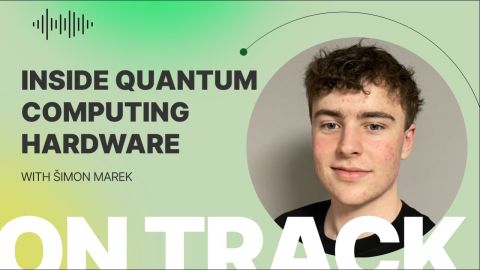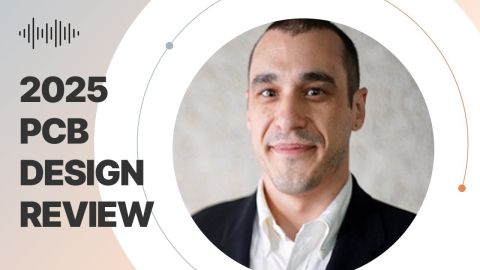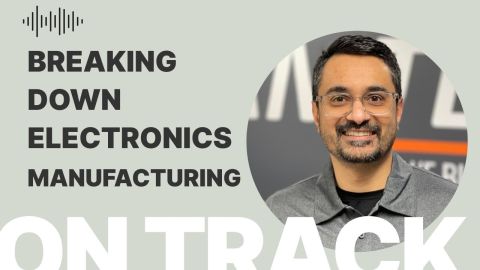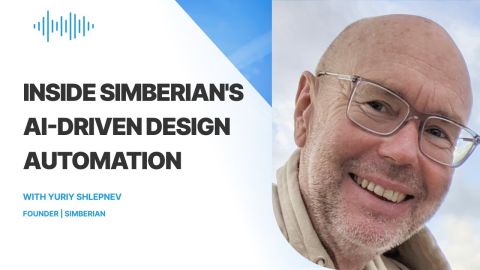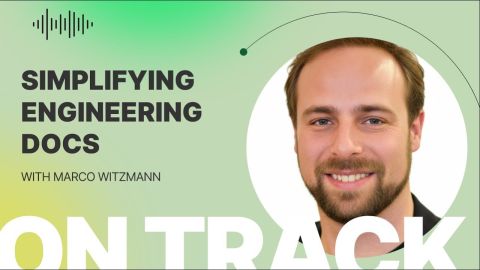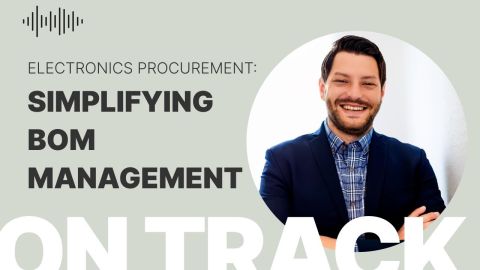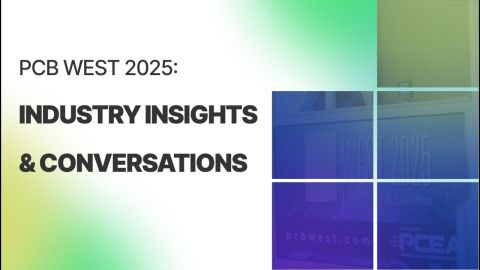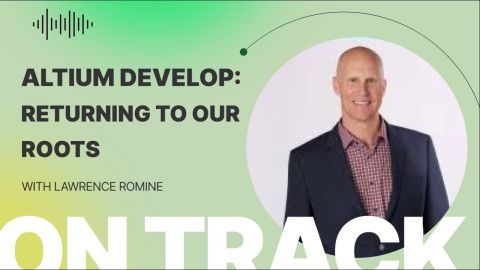The Exciting Path to Mechatronics Engineering

Continuing our discussion on PCB design education, in this episode, joining us is Fergus Downey. Fergus is a Ph.D. student and research assistant at Curtin University in Western Australia (WA) and is currently involved in the Binar Space Program. Today, we will tackle the education and opportunities related to Mechatronic Engineering and a little overview of CubeSat.
Listen to the Podcast:
Download this episode (right click and save)
Watch the video:
Show Highlights:
- Fergus's background and how he landed on the Mechatronic Engineering path
- How is the space industry in Australia driving the students to pursue an electronics-related career?
- Exposure to CAD tools and manufacturing processes helps students understand circuit design better
- Some projects the students in Western Australia like to work on
- Camera PCBs, radiation center PCB, CanSat PCB design, and more
- What are the main challenges involved in designing CubeSats, and how do Altium Designer® and Altium 365 make a great design tool for these projects?
- Electronic design and redundancy–redundant systems in limited space like in spacecraft
- Fergus talks about his team winning the second place in the #PCBetheChange design competition in 2021 with their entry Swan River Clean Up
- Fergus talks about the Mechatronics Engineering Computer Science degree being offered at Curtin University
- Checkout the Binar Space Program website and connect with Fergus on LinkedIn
Links and Resources:
Connect with Fergus Downey on LinkedIn
Binar Space Program website
Learn more about the Mechatronics Engineering Computer Science at Curtin University
Check out the #PCBeTheChange Student Design Competition Winners
Register at Altium Education for Free
Connect with Zach on LinkedIn
Full OnTrack Podcast Library
Altium Website
Download your Altium Designer Free Trial
Learn More about Altium enterprise solutions
Altium 365: Where the World Designs Electronics
Claim the special offer for Podcast listeners only
Zach Peterson:
And I guess that makes sense. Redundancy is not something that I think gets discussed often with most designs because they really aren't working towards that "we're going to be deployed in space" type of mindset.
Fergus Downey:
Yeah. And if I could fly up there and just fix it, I don't think we'd need the redundancy. But yeah, I don't have an Iron Man suit or something like that to get out there I think.
Zach Peterson:
Hello everyone and welcome to the Altium OnTrack podcast. Thank you very much for joining us today. Today we are talking with Fergus Downey, PhD student and research assistant at Curtin University in Western Australia. We're going to be talking today about educating the next generation of designers, and we're getting very passionate about this topic lately because of the recent release of Altium Education, so I'm very interested to hear his thoughts on the subject. Fergus, thank you so much for joining us on the OnTrack podcast.
Fergus Downey:
Yeah, thank you for having me.
Zach Peterson:
So Western Australia. Whereabouts in Western Australia are you located?
Fergus Downey:
We're in Perth, the main capital city where 90% of the population live, so WA is a very big state and on the other side of the world to where you guys are at the moment, but yeah.
Zach Peterson:
I'm very American so sometimes I, unfortunately, don't pay enough attention to other country geography and population makeup, so that's my fault.
Fergus Downey:
Yeah, just on the west coast and I guess the other side of the world doing our own little thing. Been very sheltered through the whole last couple years, the pandemic and all that, so been nice to focus on projects like this in the meantime.
Zach Peterson:
Yeah, that's a good point. How has it affected university operations? Did most students end up going remote or was your location already remote enough that it didn't really matter?
Fergus Downey:
Yeah. Well, Altium obviously being a software, it's pretty blissful in the fact that you can take it home with you and work at home, but COVID in WA, we basically shut our borders and no one's been going out or in really for the last two years until about a month ago, so we've been very isolated and just sort of, I don't know. It's been lucky I guess some would say, but also some of them would be like, "Let us out. Let's go do things." So it's very interesting in that regard.
Zach Peterson:
Sure. Sure. Well, I think just to introduce the audience to you and what you do at Curtin University and some of the students you work with, maybe you could give us an introduction. What's your background look like? And how did you get started with working in the electronic space?
Fergus Downey:
I started just doing my mechatronics engineering degree is what we call it over here in WA, so all of that was at Curtin University and at the end of it I had a very unique opportunity to start my honors projects with the Binar Space Program, and from there I got into my PhD and essentially we do a small CubeSat group over here in WA, and there's not many of them in Australia at the moment so it's all very new and we're all learning lots of new things, lots of new tools, and Altium has been one of those.
Fergus Downey:
We actually have used Altium to design our main electronics for our CubeSats. Yeah, and that's really played into one of the big roles that we want to have as the Binar Space Program at Curtin University, and that's education. So we're really trying to push to train students about this hardware design, how to design electronics, and also how to design for industry, so how to design for space.
Fergus Downey:
We're trying to grow that and also how to design for other industries such as mining and oil and gas, which are very prominent here in the state.
Zach Peterson:
That's interesting because you said you started in mechatronics. I'm wondering what led you down that path because I know for me, I didn't really get into this industry studying electronics directly. I'm a physicist, so I went a roundabout way into optics first and then came into electronics, so I'm always interested-
Fergus Downey:
Yeah.
Zach Peterson:
... to know how people get into this industry, and specifically, how they develop an interest in PCB design.
Fergus Downey:
Mm yeah. It's very interesting. I guess... So electronics sort of just comes from that. I guess very young on I was very interested in hobbyist electronics sort of stuff, like just when you're very young, making a motor spin or playing around with that sort of stuff, but I've always been very interested in terms of how technology works and how its internals all play together.
Fergus Downey:
So mechatronics is I guess the ultimate combination of that, so the robotic side of things combining with the software and the hardware altogether. Yeah, always sort of just been very interested in that. But then I guess going into space is just, I guess the total luck of the chance, like opportunity as it were. So Australia just deciding that they want to try and be part of that space industry going forward, just sort of lucked out and sort of was perfect timing to get into electronics and go into space altogether. So yeah, very lucky in that regard.
Zach Peterson:
Yeah, it seems like it's a new almost coming up on a new golden age for space with the development of so many commercial space companies and kind of a renewed focus beyond just putting a satellite up into orbit.
Fergus Downey:
Yeah, no, definitely. I think people are starting to realize the value that it can have on everyone's lives and sort of the value it can have on our country to be spacefaring and participating in those global activities. So yeah, very big for especially our small part of the world to try and have a big stake in that as well, given our Australian history in terms of other things as well, so.
Zach Peterson:
Sure. I think every young American man and I'm sure every young European and Australian man probably thinks this way as well, but when you're younger growing up and you probably see videos of the space shuttle or you see videos of rocket launches, it definitely evokes those dreams of going into space and building something that's going to go into space. And so I'm hoping that is maybe a new motivator today for students to get involved in electronics and to really jump right into design at all levels, whether it's structural engineering, electronics engineering, whatever the case may be.
Zach Peterson:
But I think one thing I'm wondering is with Australia's kind of renewed focus on getting involved in the space industry as you mentioned, is that a compelling driver for students? Or why do students maybe get into electronics education and pursuing a degree and a career in electronics?
Fergus Downey:
Yeah. So with the space thing, I suppose previously there's sort of been like a dream that no one can really achieve in Australia because it's just not happening. You know, you always have to go to America, you have to be that top student who can get into those American firms or they can go to Europe and maybe explore a little bit there.
Fergus Downey:
But with it happening now in Australia, people are starting to realize that like, "Hey, I can actually do this here now, I can stay here in Perth, I can stay, I can go over to eastern Australia and study electronics there." So I think it's that factor that we've gained a lot of interest and students are really coming to us and being like, "Hey, I've seen what you guys are doing on the news, on TV, around the university, I really want to get involved." So that's really pushing for students to come on board and be like, hey, what goes into these, learn about this, learn about electronics and sort of see, hey, this is actually really cool. What are the tools you can do to this?
Fergus Downey:
And that's where Altium sort of comes into it and really giving students the opportunities to just explore and have a go at designing PCBs, I think has been the biggest thing for gaining interest just because previously it's been something no one really has tried to access or tried to do in WA. So we're really giving that entry point for them to come in and learn all those things.
Zach Peterson:
Yeah. So what kind of challenges do students face when they first get into working on like their first PCB? I know when I first looked at CAD software and looked at a PCB layout, I had no idea what I was looking at. You know what I mean? It's, without someone to explain, this is the copper, this is not copper, simple things like that, it can be kind of a different way to look at something that is actually going to be manufactured. And I'm wondering what kind of challenges do students face when they first get started with design?
Fergus Downey:
Yeah. So we really try and make sure we talk about the manufacturing process. So the layering and how they design it that way first and like you said, I think that really helps build the understanding in terms of how these things are put together can really help tell you like how to make it. But then when it comes to actually learning Altium itself, yeah, I think it can be a bit of a steep learning curve for some, but once they get into it, once you learn the basics, I think you really just have that freedom to go and try different things and play around with the software. There's so much support for Altium. I think it's really good in that regard in terms of you can pretty much Google any problem you're having and find a solution to it. So that makes it really easy for your students to learn.
Fergus Downey:
And also just having people who are experienced and just having a really open door so they can come and ask questions if they need to. We are just starting to run educational workshops and teaching people how to do it that way. And I also think that's been really good to have them come in, learn a few things, go away, work on it themselves and come back again and ask us questions and develop there. So, yeah, I think there are small challenges, but Altium really plays itself to be a really good software to help educate and help teach and also just provide support when you're stuck on something so it's really good that way.
Zach Peterson:
Do students come in with CAD experience? Have they maybe like played around with a freeware program or something like this? Or are they just looking at an electronic CAD package for the first time?
Fergus Downey:
Mm so I think, yeah, that's a really good question. Usually we do ask them if they've had experience with another software and I guess maybe I would say one in five would say that they have, and they've sort of done their own little bit of tinkering before. But quite a lot of them, especially at our university, will have had experience in a hardware design software, so that sort of stuff, so they do sort of have like a reference, I guess, to the CAD interface and what that looks like, and I think that does help in some regard as well, so.
Zach Peterson:
So like mechanical CAD tools?
Fergus Downey:
Yeah. Mechanical CAD tools. Yeah.
Zach Peterson:
Yeah, sure. Okay. That makes sense. I think that's probably a lot easier for students to get into conceptually because it's much easier to think about, on building a solid object, it's much easier to visualize. Whereas when you start looking at the electronics, maybe it's a little bit too unfamiliar if they're not familiar with the structure of circuit boards generally. I wonder if it's difficult to jump into a CAD tool and start playing around and start working on something. It's like, where do you even start?
Fergus Downey:
Yeah, no, that's definitely the case. I think, yeah that's why we always try and like show them a circuit board, talk about how it's built and all that sort of stuff to sort of give them like what are they looking at when they see these layers in the CAD software? What does each layer mean? How does it sit there? How do vias work? All that sort of stuff I think is, yeah, it's really good to have that background.
Zach Peterson:
Yeah and I like that you're talking in terms of the manufacturing process, because I think a lot of especially hobbyists who maybe it's their first time trying to make the transition to actually produce something or maybe they're a student and it's their first design. They kind of want to jump in and just go for it and not really think about, hey, we need to turn this into a physical product one day. So if you can't manufacture it, the design doesn't really matter. How deep do you guys go into the manufacturing process? I mean, do you go as far as getting students into tours? Is it video? I'm wondering what's kind of that format?
Fergus Downey:
Yeah. So we don't actually have a manufacturing facility in WA. There are, so I say WA, that's Western Australia, there are people who are trying to, I guess, get set up for that. So a lot of ours are sort of like shipping to either America or shipping to China or even the east coast of Australia.
Fergus Downey:
But there are like UOAs that coming out now, so like the milling processes to do like two layer boards and that sort of stuff. So I guess when it comes to actual manufacturing process, it's all just like video tutorials or like explaining how it all works. We haven't actually been able to do the tours of fab houses or anything like that yet. But yeah so it's as involved as we can get in terms of teaching them about the process and sort of explaining how it all happens, so.
Zach Peterson:
Well, that's really good though. I mean, at least giving students some idea of the limits of what is manufactureable hopefully keeps them inside of the lanes on the highway, so to speak.
Fergus Downey:
Yeah, that's it.
Zach Peterson:
So what kind of things do students like to work on? Like what types of projects?
Fergus Downey:
So in the Binar Space Program, mainly it's like research payloads and stuff at the moment and undergraduate student payloads. So stuff like camera PCBs, we're doing a radiation center PCB to be at the moment and I guess just interfacing. So how do you connect all these things together? So that's, I guess that's the main work for students at the moment, but so in new teaching units now, though, they're sort of doing, I guess it's called like a CanSat PCB design. So it's basically like small spacecraft subsystems working, how to put all those together and designing something from there. So it's really educational or research based, but we do have a couple of students who are using it for hobby stuff, just on a very small scale. But yeah, so a lot of that's the, I guess the main area that they're entering at the moment
Zach Peterson:
And I mean with, with working on CubeSats, what are some of the...So students participates in the CubeSat projects, correct?
Fergus Downey:
Yes. Yep. Yeah. That's it.
Zach Peterson:
Yeah. So what are some of the main challenges involved in designing CubeSats? Because I've seen CubeSats, I've talked to some people, I don't know all of the deep details that go into any of the boards that go into them. So it's something that I will admit I need to learn more about.
Fergus Downey:
Yeah. So I guess what you have seen in CubeSats is probably the very standard or common sort of like stacks of boards with connectors through the side of them. So that's not what we took as our approach. So we didn't build each individual subsystem. So for a spacecraft, you have a power system, the communication system, the computer, all of that. But what we did is we actually took all of those PCBs and combined them into a single integrated PCB. So I guess our main satellite core is very integrated and very complicated.
Fergus Downey:
So that's where Altium has been a really useful tool in terms of combining all of that onto a single circuit board. So that's been, obviously one of the biggest challenges is getting that small scale design I into a really integrated package, but a program's like Altium 365 now and the, I guess as Altium's evolved, it's becoming really quite good to look at how that will connect to the payloads, which then come in underneath or how hardware design can go in around that. And then also when we're starting to look at our own, like other subsystem on the top as well, it's really nice for being able to sort of work with all that together. So in terms of the challenges, I think they're sort of all being solved for us as we move along at the moment. Yeah, so.
Zach Peterson:
It, I mean, these devices need to be very highly reliable. Obviously you're going to put anything in space you got to put it on a rocket first. So it's going to have to undergo mechanical shocks, thermal shocks. Eventually it's going to go up into the upper atmosphere and then be subject to more thermal shocks, thermal cycling. What are some of the high reliability design practices that you try and teach? Because I know some of these are going to apply beyond just a CubeSat right? They can apply in automotive. I think you mentioned mining and oil and gas earlier.
Fergus Downey:
Yep. So a big thing is testing. Obviously we do a lot of that and also just I guess, work reviews. So we do have a really strong checking process. So any design we do, you got, everyone will go on Altium 365 and they'll go through and they'll check over everything. They'll look through all the schematics, all the PCB routing, leaving lots of comments and stuff like that. So I guess that's been, that's a big part of the checking process is a big thing. And then obviously like you said, you get the thermal shocks and the mechanical shocks. So we do vibration testing. We have a shaker table, we'll get all the electronics on there to make sure we shake it to launch conditions.
Fergus Downey:
Our thermal vacuum chamber, we will cycle it, you know, through 100 to -100 degrees, really stress these boards and make sure there's no like warping or like desoldering and that sort of stuff. So a big part of space is teaching those things around and the actual pre-testing process for that higher reliability design when it actually comes to electronics design and redundancy is massive. So looking at how you can, I guess, make redundant systems on limited space is a really big challenge and something we're always trying to work out how to improve and do better. So yeah.
Zach Peterson:
So when you say redundancy, you mean like, not just if one component fails, but maybe like a subsystem in the device fails, there's going to be a backup. How many do you guys get?
Fergus Downey:
At the moment it's really only dual redundancy is what we aim for just because obviously space is a big thing. You're only in a 10x10x10 cube. You really, if you go above and beyond, you just add too much complexity and it gets really difficult. So yeah, I need reduce redundancy levels. So I guess an example with that would be with the solar panel converters, we do redundant those. So if you know, one goes, we still have the other one there to provide some power and back us up, so.
Zach Peterson:
Okay. Yeah. That's interesting. And, and I guess that makes sense. Redundancy is not something that I think is discussed often with most designs because they really aren't working towards that. We're going to be deployed in space type of mindset.
Fergus Downey:
Yeah, yeah. You know, if I could fly up there and just fix it, I don't think we'd need the redundancy, but yeah. I don't have an Iron Man suit or something like that to just get out there. I think so.
Zach Peterson:
Right. Right. Well, and I'm sure with like mining and oil and gas, there's also that issue of you can't just swim down to the bottom of the ocean where you are maybe doing deep water drilling and fix it. Resolder that cast back onto the regulator or something like this.
Fergus Downey:
Yeah, yeah, no, that's definitely it. So yeah, there's definitely parallels that we can draw between there, especially with our ROVs, so the remote operative vehicles underwater, there's a few companies in Perth who are designing and building these. So it's always good to sort of chat with them and share the challenges that they have as well.
Zach Peterson:
Sure, sure. So I'd like to switch gears just for a moment because you actually participated in a student design competition in 2021 called PCB the Change. And if anybody is who's listening is interested, we'll actually include some information on this in the show notes, but you were on a team that won second place in the PCB the Change design competition. Can you tell us about your experience in that competition? What you guys built, how the competition works, all of that type of stuff.
Fergus Downey:
Yeah. So I had a really good time in the competition. We ended up just putting like, I guess a notice out to the university and saying, hey, Binar Space Program's interested in taking part of this competition. And we had a bunch of students just come forward and say they're really interested in PCB design and they want to learn these skills. So it was really good to just sort of go through design process with a bunch of new students and sort of teach them a bit about hardware design a bit about Altium we're looking at obviously, cause that was what the design was in. Our design ended up being a floating boy for the Perth rivers. And we essentially were monitoring, I guess, water pollutants in our, so Perth is a big river called the Swan River that runs through the middle. So we're basically monitoring water pollutants in there.
Fergus Downey:
And yeah, I think we tried to engage really well with the local community as well. So we engaged with the department of parks and wildlife here in WA. Sort of gather their needs, work out what they want. And I think it was just going through that whole process to PCB design and working out the nitty gritty that way that I think a lot of the students took a lot away from and also learned a lot. So it was really good to place second in that I think it was really good. And I also think that as far as I've been told, the first place team also came from Curtin University. So it was really great to see the students sort of all getting a really good education here and there they're sort of really all passionate and keen because obviously now those students who came first are also coming to us and asking about Altium and the actual, I guess the next level up of the software and how they can get access to that. So, yeah, really good competition. And I think it's been really valuable for Curtin University in general.
Zach Peterson:
Sure, sure. And I'm wondering if competitions like this are the type of thing that really force students to kind of dig in deep into something that they're passionate about, is that something that you experienced yourself when you were participating in this, in the competition? I mean, you have to dig in deep into something or was it more, you had to pick something that was practical or something that was assigned to you? You know, how did you guys get into to doing like a water buoy?
Fergus Downey:
Yeah. So there was no, no forcing, there was sort of just, yes, we all came together with a bunch of different ideas. So essentially we gave the students like the chance to come forward with their ideas. We sort of all had a chat about the whole list of ideas. We brainstormed what we put into each idea and sort of went from there. And then we selected one idea from that as a team. So it was like a voting system and yeah, I think it was really good for them to just all also just work together and work out all these challenges. So I was trying not to have too much guidance to make sure they could do what they wanted, but yeah. So I think it was really good in that regard.
Zach Peterson:
Sure. And, and I suppose at some point they're looking for that link between what they care about and something that's practical, right? Because I mean, at the end of the day, what they're building should ideally do something useful or help solve a practical problem.
Fergus Downey:
Yeah, definitely.
Zach Peterson:
Instead of just being cool looking, right.
Fergus Downey:
Yeah, yeah. Definitely that purpose and that drives to sort of do something worthwhile. And I think it's just also a really good experience for them for when they do move out of university setting into the real world, into industry, they have that experience of like sort of going through the complete design process and coming up with something actually practical and then working with the stakeholders and the problem and solving forward from that. So yeah, it was a really good competition for that and I'd be interested to see what they sort of go for next year in terms of the challenges. And it also would've been, I think really good to see what the other teams are also interested in designing and what they're interested in working through, just to see, I guess, what's going on in other parts of the world and where their environmental challenges lie. So.
Zach Peterson:
Sure. So, I mean, I know that you did something with an environmental challenge. I mean, what other kinds of submissions were there as part of this competition?
Fergus Downey:
Yeah-
Zach Peterson:
Just environmental stuff, or?
Fergus Downey:
Yeah, so it's supposed to be like around an environmental, a local environmental challenge.
Zach Peterson:
I see.
Fergus Downey:
That's why we picked out Swan River one and I think the team who came first, they did a bushfire monitoring system. So obviously Australia gets bush fires much like the, I think the west coast of America has been getting as well. So just, I guess, early detection systems for that. I think they used like a bunch of smoke detectors that worked on a Laura system, so.
Zach Peterson:
Oh, okay. So like a Laura based mesh network.
Fergus Downey:
Yeah. I think ours was Laura based as well. So a mesh network over the Swan river to monitor water pollutants. Yeah.
Zach Peterson:
Very interesting. Very interesting. Yeah. I live on the west coast of the US and every year we get some level of wildfires, usually starting south of California, but every single year and I think you wish that you could catch them earlier. So I definitely understand what you're saying with catching bush fires earlier. Well, that's very cool that students kind of dig in and find something that they're passionate about, even if it is kind of constrained in this area of like environmental that they can dig in and actually develop something that's really practical. I think that's, not only is it important just in terms of saving the environment, but also getting students to really think through the process for electronics.
Fergus Downey:
Yeah. Yeah, definitely. So I suppose I could talk a little bit more about the design in general, but so yeah, the electronics connections that it was like they, we had to use the Portenta H7, which is awesome to look at as well in terms of the new micro controller. And then that was with the Laura system. We had some solar panel connectors and converters, and then also all that breakouts to our underwater sensors. And I think that was really good for them to sort of just look at just even just the block diagram process and working all of that out in terms of how it all connects up on the PCB in the first place before they go to the schematic design and they're attached for that way.
Fergus Downey:
I mean, our firm is very different in, I guess, in regards that it tries to skip that schematic design process. It just goes straight to PCB design in terms of like the block stacking process, but it still gave them that really entry level understanding of PCB design and how things can be placed and worked together and you know, how all the connections are made. So that was really nice in that regard.
Zach Peterson:
Yeah. I mean, I get what you're saying about Upverter. I think it's kind of cool just for the person who is trying to figure out, like, how do I take the idea that I have and make it into something functional without getting bogged down in all of the really deep points about schematic design that I don't understand yet? Would you agree that's a kind of a fair way to approach Upverter or it's like a similar tool that might do something with modular?
Fergus Downey:
Hmm. Yeah, I think I would agree with your point. Yeah, it's definitely, it was, yeah, very nice at just breaching that gap. I guess that Altium is a big, really big step in getting into the PCB design process, which was just really good for that middle ground and sort of those stepping stones to push you through and I guess get you to that point where you're ready to step into Altium and ready to go. So it's good.
Zach Peterson:
Yeah. Yeah. That's great. And I mean, students that you're dealing with it sounds like they're all EEs, they all want to do EE, do you get a lot of computer engineers as well, or computer science or computer science majors? I mean, as well.
Fergus Downey:
Yeah. We do get a lot of commute science majors, but what was that? EE, sorry? Yeah.
Zach Peterson:
Sorry. That's the American electrical engineers or electronics engineers.
Fergus Downey:
Oh, okay. Yeah. Right. Yeah, no. So yeah, lots of software engineers actually at Curtin there's this great degree, which is a mechatronics software, mechatronics engineering computer science degree. And a lot of students are coming from that degree in terms of with a software background, just, and the electronics background as well, which has been really nice for, I guess, they want to learn how to use these electronics as well. You know, the not like there's no really PCBs of design these days without a micro controller on board or anything like that. So it's, it's definitely that application side as well, which I think is really good. And now it's been great for them to get that the hardware experience, which is, I guess, sort of lacking at Curtin University at the moment, so.
Zach Peterson:
We have this kind of a problem, I guess you could say, within the electronics industry, at least in the American side of things, which is that so many students I think get, they gravitate towards software, and I'm not saying we don't need software developers, but you know, you can't deploy software anywhere unless you have a board to hold all the chips that is going to actually run all of the software. And so I think kind of the PCB gets forgotten about, but I think it's interesting, you guys are taking the mechatronics approach to really bridge the software side of things and get that group of students interested in electronics design. So bravo on that. That's my response to that. I wish we could do that more in the US.
Fergus Downey:
Yeah. I think we're starting to get worried that we have too many people interested in the hardware design now rather than the software side of things. So it's making sure there is a balance and it's getting that right as well. So, yeah.
Zach Peterson:
We'll ship you some software folks and you can ship us some hardware folks and it'll be an even trade.
Fergus Downey:
Yeah. Yeah. I'm sure that'll work out well.
Zach Peterson:
Well, Fergus, thank you so much for talking with us. This has been really enlightening and I hope anyone who is interested in learning about the PCB the Change competition will check out the show notes and give it a read. Also Fergus, if folks want to connect with you on LinkedIn, are you okay with that? We can put your LinkedIn profile on the show notes.
Fergus Downey:
Yes, that's great. You can do that.
Zach Peterson:
Yeah. Anyone who wants to connect with Fergus, discuss electronics education and discuss what he does with CubeSats, please go ahead and check out his LinkedIn profile, send him a DM and yeah. Anything else you want to leave us with before we sign off?
Fergus Downey:
No, I think that really wraps it up nicely. Yeah. Just if you're interested as well, you can check out the Binar Space Program website and really see what we're doing with that. At the moment we're sort of trying to reach out into high schools as well. So there's a big education part growing in there as well, so.
Zach Peterson:
Yeah, absolutely. Absolutely. And I know Upverter is kind of more targeted towards the high school user, but that's definitely something we need to do in the US. And we'll be talking more about that. So hopefully we can have you on again after some time and maybe see how that has progressed in terms of expanding the horizons for more students at all levels to join in the electronics industry.
Fergus Downey:
Yeah. I think that'd be excellent.
Zach Peterson:
Okay. Great. Well, thank you so much for joining us and everybody who's listening out there. Please check out the show notes, learn more about what Fergus does and learn more about the PCB the Change competition, and make sure to like and subscribe and last but not least don't stop learning. Stay on track.

